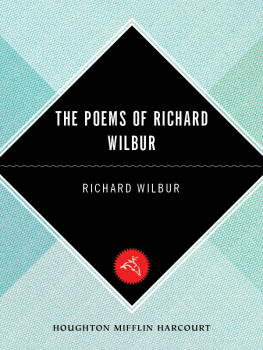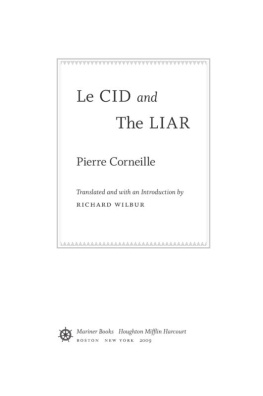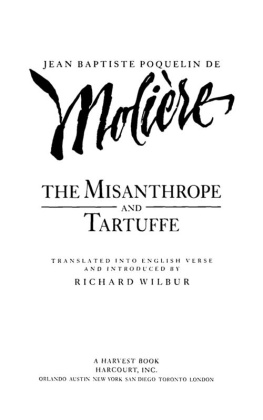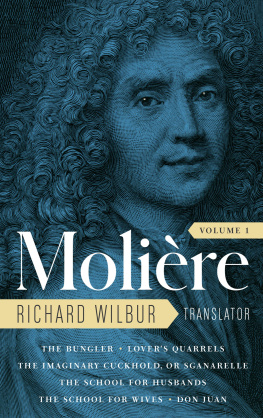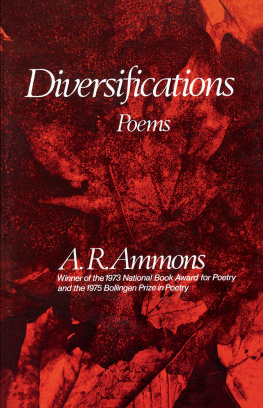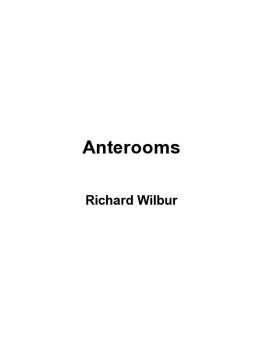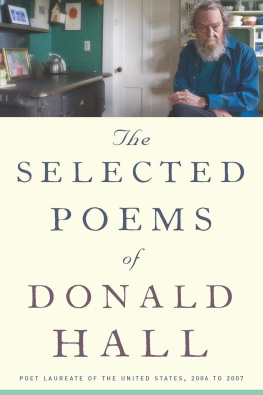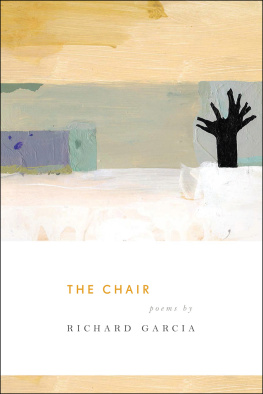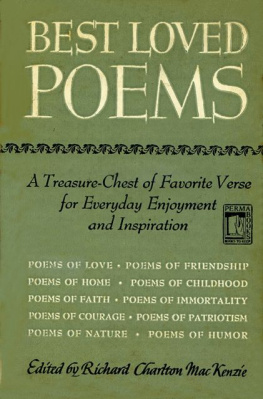Copyright 1963, 1961, 1960, 1959, 1958, 1957, 1956, 1955, 1953, 1952, 1950,1949,1948, 1947 by Richard Wilbur
Copyright renewed 1987, 1986, 1985, 1984, 1983, 1981, 1980, 1978, 1977, 1976,1975 by Richard Wilbur
All rights reserved. No part of this publication may be reproduced or transmitted in any form or by any means, electronic or mechanical, including photocopy, recording, or any information storage and retrieval system, without permission in writing from the publisher.
For information about permission to reproduce selections from this book, write to Permissions, Houghton Mifflin Harcourt Publishing Company, 215 Park Avenue South, New York, New York 10003.
www.hmhbooks.com
"Beasts," "A Prayer to Go to Paradise with the Donkeys," and "The Pelican" appeared in A Bestiary, by Richard Wilbur, copyright, 1955, by Pantheon Books, Inc.
The poems "Grasse: The Olive Trees," "Year's End," "Juggler," "Clearness," "The Sirens," "In the Elegy Season," "Boy at the Window," "The Beacon," "Exeunt" (originally published under the title "Exodus"), "Merlin Enthralled," "After the Last Bulletins," "A Black November Turkey," "All These Birds," "A Baroque Wall-Fountain in the Villa Sciarra," Loves of the Puppets," "Two Voices in a Meadow," "Someone Talking to Him-self," "A Fire-Truck," "Advice to a Prophet," "A Grasshopper," "Two Quatrains for First Frost," "In the Smoking-Car," "A Summer Morning," "October Maples, Portland," "Stop," "Ballade for the Duke of Orlans," "Next Door," "The Undead," "A Hole in the Floor," and "The Aspen and the Stream" appeared originally in The New Yorker. Other poems appeared originally in Accent, American Letters, The American Scholar, Atlantic Monthly, Audience, Beloit Poetry Journal, Between Worlds, Botteghe Oscure, Chicago Choice, Foreground, Furioso, Harvard Advocate, Hopkins Review, Hudson Review, Imagi, Inventario, Junior Bazaar, Kenyan Review, Mandrake, The Nation, New Directions No. 10, Nimbus, Origin, Paris Review, Partisan Review, Poetry, Poetry New York, Poetry Quarterly (London), Quagga, Quarterly Review of Literature, Trinity College Review, Spectrum, Tiger's Eye, Transatlantic Review, Virginia Quarterly, and Wake.
The Library of Congress has cataloged the print edition as follows:
ISBN 0-15-672251-8
eISBN 978-0-544-10895-0
v1.1112
ADVICE TO A PROPHET
AND OTHER POEMS
(1961)
FOR LILLIAN HELLMAN
Two Voices in a Meadow
A Milkweed
Anonymous as cherubs
Over the crib of God,
White seeds are floating
Out of my burstpod.
What power had I
Before I learned to yield?
Shatter me, great wind:
I shall possess the field.
A Stone
As casual as cow-dung
Under the crib of God,
I lie where chance would have me,
Up to the ears in sod.
Why should I move? To move
Befits a light desire.
The sill of Heaven would founder,
Did such as I aspire.
Advice to a Prophet
When you come, as you soon must, to the streets of our city,
Mad-eyed from stating the obvious,
Not proclaiming our fall but begging us
In God's name to have self-pity,
Spare us all word of the weapons, their force and range.
The long numbers that rocket the mind;
Our slow, unreckoning hearts will be left behind,
Unable to fear what is too strange.
Nor shall you scare us with talk of the death of the race.
How should we dream of this place without us?
The sun mere fire, the leaves untroubled about us,
A stone look on the stone's face?
Speak of the world's own change. Though we cannot conceive
Of an undreamt thing, we know to our cost
How the dreamt cloud crumbles, the vines are blackened
by frost,
How the view alters. We could believe,
If you told us so, that the white-tailed deer will slip
Into perfect shade, grown perfectly shy,
The lark avoid the reaches of our eye,
The jack-pine lose its knuckled grip
On the cold ledge, and every torrent burn
As Xanthus once, its gliding trout
Stunned in a twinkling. What should we be without
The dolphin's arc, the dove's return,
These things in which we have seen ourselves and spoken?
Ask us, prophet, how we shall call
Our natures forth when that live tongue is all
Dispelled, that glass obscured or broken
In which we have said the rose of our love and the clean
Horse of our courage, in which beheld
The singing locust of the soul unshelled,
And all we mean or wish to mean.
Ask us, ask us whether with the worldless rose
Our hearts shall fail us; come demanding
Whether there shall be lofty or long standing
When the bronze annals of the oak-tree close.
Stop
In grimy winter dusk
We slowed for a concrete platform;
The pillars passed more slowly;
A paper bag leapt up.
The train banged to a standstill.
Brake-steam rose and parted.
Three chipped-at blocks of ice
Sprawled on a baggage-truck.
Out in that glum, cold air
The broken ice lay glintless,
But the truck was painted blue
On side, wheels, and tongue,
A purple, glowering blue
Like the phosphorus of Lethe
Or Queen Persephone's gaze
In the numb fields of the dark.
Junk
Huru Welandes
worc ne geswice
monna anigum
ara e Mimming can
heardne gehealdan.
WALDERE
An axe angles
from my neighbor's ashcan;
It is hell's handiwork,
the wood not hickory,
The flow of the grain
not faithfully followed.
The shivered shaft
rises from a shellheap
Of plastic playthings,
paper plates,
And the sheer shards
of shattered tumblers
That were not annealed
for the time needful.
At the same curbside,
a cast-off cabinet
Of wavily-warped
unseasoned wood
Waits to be trundled
in the trash-man's truck.
Haul them off! Hide them!
The heart winces
For junk and gimcrack,
for jerrybuilt things
And the men who make them
for a little money,
Bartering pride
like the bought boxer
Who pulls his punches,
or the paid-off jockey
Who in the home stretch
holds in his horse.
Yet the things themselves
in thoughtless honor
Have kept composure,
like captives who would not
Talk under torture.
Tossed from a tailgate
Where the dump displays
its random dolmens,
Its black barrows
and blazing valleys,
They shall waste in the weather
toward what they were.
The sun shall glory
in the glitter of glass-chips,
Foreseeing the salvage
of the prisoned sand,
And the blistering paint
peel off in patches,
That the good grain
be discovered again.
Then burnt, bulldozed,
they shall all be buried
To the depth of diamonds,
in the making dark
Where halt Hephaestus
keeps his hammer
And Wayland's work
is worn away.
Loves of the Puppets
Meeting when all the world was in the bud,
Drawn each to each by instinct's wooden (ace,
These lovers, heedful of the mystic blood,
Fell glassy-eyed into a hot embrace.
April, unready to be so intense.
Marked time while these outstripped the gentle weather.
Yielded their natures to insensate sense,
And flew apart the more they came together.
Where did they fly? Why, each through such a storm
As may be conjured in a globe of glass
Drove on the colder as the flesh grew warm,
In breathless haste to be at lust's impasse,
To cross the little bridge and sink to rest
In visions of the snow-occluded house
Where languishes, unfound by any quest,
The perfect, small, asphyxiated spouse.
That blizzard ended, and their eyes grew clear,
And there they lay exhausted yet unsated;
Why did their features run with tear on tear,
Next page
